Ever notice that your teeth are not as white as they used to be when you look in the mirror?
Or
Have you ever noticed black or brown stains on your teeth?
Getting scaling and polishing done by a dentist is the best solution to this problem!
Scaling and polishing of your teeth may sound like a big dental procedure but it is just a normal part of oral hygiene that keeps your smile healthy and looking good!
A lot of people get scared or uneasy when they hear words like “polishing” and “scaling“ but in reality, scaling and polishing is a simple thing that you can get done to keep plaque and tartar from building up.
If you know about these procedures and how they can help you, you can feel better about them and be a better patient.
Here we are going to teach you everything you need to know about what scaling and polishing really is!
Let’s get started!
What is Teeth Scaling and Polishing?
Teeth scaling and polishing are professional cleaning techniques. These are made to clean the surfaces and gumlines of your teeth of plaque (a soft, sticky layer of saliva, food and bacteria), tartar (calculus), and stains. Both procedures are very important for keeping your teeth healthy and preventing oral diseases.
Scaling
The main goal of scaling is to get rid of hardened plaque deposits. Dentists use special tools to target the gumline and tooth surfaces where these deposits build up. This step is crucial for preventing gum disease. As tartar cannot be removed by regular brushing and flossing alone.
Polishing
Polishing smooths out the tooth surfaces after scaling. Dentists remove surface stains with a soft rubber cup and a paste that is slightly rough.
The paste also helps to buff out any pits or grooves on the teeth creating a smoother surface that is more resistant to plaque buildup.
This gives teeth a brighter appearance and makes it harder for plaque to adhere in the future. Polishing is the last step in cleaning teeth. It gives them a clean, smooth look.
Benefits of Teeth Scaling
Scaling teeth is not just about appearances. It is a crucial part of preventing and controlling dental and gum issues. Here are some key benefits of scalling:
Prevention of Gum Disease
Plaque and tartar are leading causes of gingivitis and periodontitis. If these substances build up along the gumline, they cause inflammation and bleeding. It eventually causes gum disease.
Scaling protects gum health by getting rid of these deposits. This lowers the risk of infections and tooth loss over time.
Protection Against Bad Breath
Plaque and food particles stuck in between teeth and under gums causes of bad breath. It is called halitosis. Regular scaling reduces the bacteria that cause foul odors. This helps you maintain fresh breath.
Studies show 90% of cases of bad breath are related to poor oral hygiene so scaling is a powerful ally against this issue.
Improved Oral Health
Scaling also contributes to overall oral hygiene. Tooth decay is a major oral health problem around the world. Regular dental cleanings can help stop it.
The World Health Organization highlights that nearly 3.5 billion people globally suffer from oral diseases. These are primarily due to cavities and gum issues that professional scaling can help prevent.
Prevention of Tooth Decay
Plaque contains bacteria which produces acids over time. These acids weaken tooth enamel which causes cavities. Scaling removes this harmful layer. This preserves tooth structure and prevents decay.
Aesthetic Benefits
Teeth naturally gather stains from everyday eating and drinking habits especially from coffee, tea, and wine. Scaling and polishing remove surface stains. It gives your teeth a cleaner, brighter look.
Although it is not a whitening treatment, it can significantly improve tooth color by removing these minor discolorations.
Is Scaling Good for Teeth?
Yes, scaling is beneficial and necessary for maintaining healthy teeth and gums.
However, some misconceptions about scaling may make people hesitant to undergo the procedure.
Here is a closer look at why scaling is good for teeth:
Essential for Gum Health
One common myth is that scaling weakens teeth or damages enamel but in reality, scaling targets only the hardened plaque and tartar that cannot be removed by brushing alone.
This prevents inflammation and gum disease which are much more harmful in the long run.
Does Not Harm Enamel
Dentists use specialized tools for scaling. These are designed to leave tooth enamel intact. Plaque and tartar that are full of bacteria are removed by scaling which can erode enamel over time so scaling protects enamel instead of hurting it.
According to dental studies, periodic scaling does not affect enamel strength; it, in fact, preserves it.
Frequency Matters
Scaling is good for you but you do not have to do it all the time unless there is a specific problem, like gum disease which has gotten worse.
Scaling and polishing teeth twice a year during regular dental check-ups are enough for most people to keep their teeth healthy.
Polishing of Teeth After Scaling: Why Is It Important?
Polishing is often considered the “finishing touch” after scaling. It enhances the benefits of the dental cleaning process.
Here is why polishing is a valuable part of dental cleaning:
Smooths Tooth Surfaces
Some parts of your teeth may feel rough or uneven after scaling because the tartar was removed. Polishing smooths out these areas which helps keep plaque from sticking to teeth in the future.
A smooth surface makes it more difficult for bacteria to cling. Thereby, this improves overall cleanliness.
Adds Shine and Brightness
Polishing removes superficial stains caused by food, drinks, and other lifestyle habits. This makes teeth appear bright and shiny.
Although polishing is not as intense as professional teeth whitening, it significantly enhances the overall appearance of teeth by removing discoloration on the outermost surface.
Prevents Plaque Buildup
Polished teeth are less likely to develop plaque buildup due to the smooth finish. This contributes to longer-lasting results after your cleaning session. It also keeps your teeth healthier between visits.
Scaling and Polishing Process
Patients may feel more at ease if they know how scaling and polishing are done.
Here is a step-by-step breakdown:
Initial Examination
Your dentist will start by examining your mouth to assess the levels of plaque and tartar. And to determine if there are any signs of gum disease.
Scaling
The dentist will use either a handheld scaling tool or an ultrasonic scaler.
The ultrasonic scaler uses vibrations to break up tartar.
And
The handheld tool scrapes away deposits. Both methods are effective and safe.
Polishing
Next, after scaling, polishing paste is put on each tooth. A tool with a soft rubber cup is used for this purpose. The paste has a mild abrasive in it that gets rid of surface stains without hurting them.
Rinsing and Final Check
The dentist will rinse your mouth to clear away any residue. Conduct a final check to ensure your teeth are clean and smooth.
Conclusion
Teeth scaling and polishing are essential for maintaining oral health. This prevents gum disease and enhances the appearance of your teeth.
If you get scaling and polishing done regularly, your gums will be healthier, your breath will smell better, and your smile will look better.
As long as you brush and floss every day and go to the dentist regularly, you will have good oral health for life.

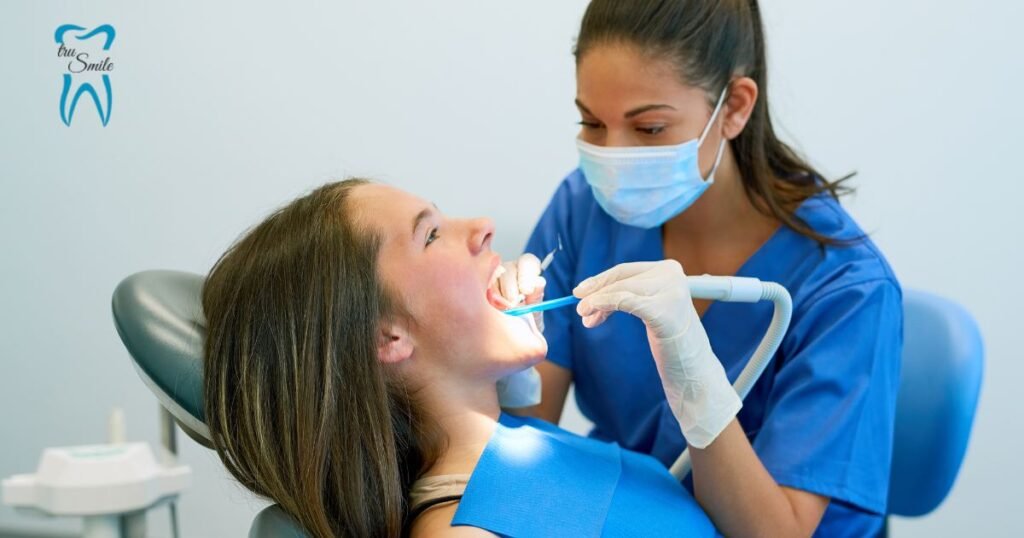
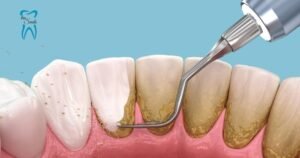
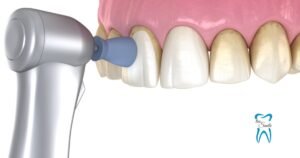
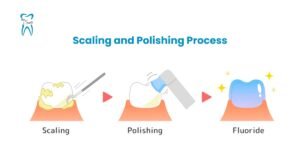
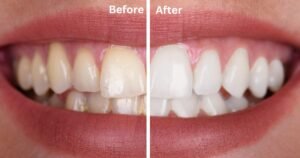
One Response